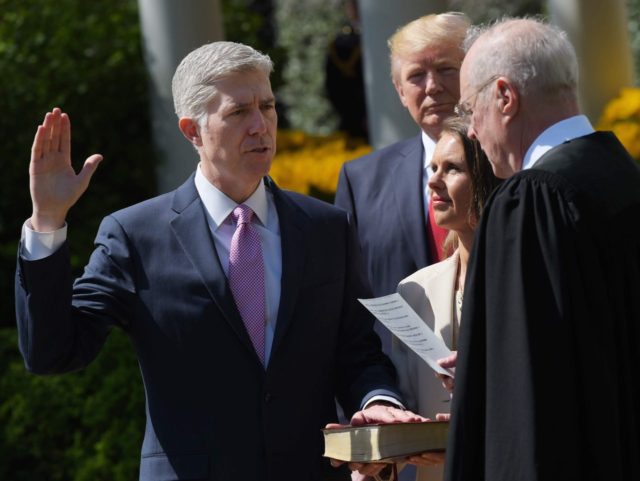Donald J. Trump made such bold promises regarding the type of federal judges and Supreme Court justices he would appoint as president that his detractors said he must be pandering. One year later, President Trump has the most consistent record of nominating only originalists to the federal bench of any modern president.
President Trump has made 56 nominations thus far to the federal courts to fill the 166 current and upcoming vacancies on the bench, with more coming soon. Those nominees are the most consistently and provably conservative picks of any president since the courts became a political issue more than a half-century ago.
There is not been a conservative majority on the Supreme Court since 1934—more than 80 years. Since that time, the Court has gone back and forth between right-leaning moderate, moderate, left-leaning moderate, liberal, and very liberal. Never conservative.
Federal judges are nominated by the president and confirmed by the Senate, then serve for life. Conservatives say that the only legitimate way for unelected and politically unaccountable judges to interpret the Constitution and lesser laws in America’s democratic form of government is according to the original public meaning of their words. Those who hold to this belief are called originalists.
After eight decades of the Supreme Court’s deviating from the original meaning of the Constitution, the federal government has exploded in size and scope, blurring the Constitution’s separation of powers, undermining its checks and balances, and violating its guarantees of the role government plays in the lives of American citizens.
Donald Trump understood that. After the sudden passing of the iconic Justice Antonin Scalia, candidate Trump promised that if elected, he would nominate judges in the mold of Scalia.
Given that Trump did not have any background in law or a long public record of supporting conservative judges, critics balked. They considered it playing to the GOP base for votes.
Trump responded by working with the Federalist Society, which is the flagship conservative legal organization in the United States dedicated to originalism, and the Heritage Foundation, one of the premiere conservative think tanks in America, to develop a list from which he would choose Scalia’s successor.
That list was a who’s-who of conservative legal leaders in the country, all but one of them a sitting judge. Critics said it was too good to be true, and latched onto every word of Trump’s off-the-cuff speaking style to parse each sentence, concluding that he left himself wiggle room to deviate from that list if he won. They insisted he would bargain away Scalia’s seat for a moderate, “consensus” candidate (there is no such thing these days) in exchange for some legislative accomplishment.
Trump pounded away on the issue of the courts right up to Election Day. Never before in American politics has the Supreme Court—and all other federal courts under it—been such a central issue in a race for the White House.
Then on November 8, 2016, Trump was elected the 45th president of the United States. Polling data showed that for 21 percent of voters, the Supreme Court was the #1 issue that determined their vote. Those voters went for Trump 57 percent to 41 percent, a potent plus-16-point issue for the Republican nominee, helping to propel the business mogul to the White House.
As head of state, President Trump has blown the doors off the hinges when it comes to judicial nominees. He successfully appointed Justice Neil Gorsuch to the Supreme Court, a spectacularly well-credentialed legal genius who may actually be slightly to the right of the beloved Justice Scalia, more in the mold of Justice Clarence Thomas.
But President Trump has not stopped there. Instead, his White House counsel and Department of Justice has continued to consult with experts from the Federalist Society and Heritage Foundation to identify committed originalists for every seat on the 13 U.S. courts of appeals. They have also insisted on rigorous screening for the seats on the 94 U.S. district courts, consulting home-state senators, but insisting on conservative credentials.
Although Democrats have tried unprecedented tactics to delay or derail these judicial nominees, the Senate has recently broken the logjam, taking the number of confirmed nominees from 7 to 13 in just one week, and promising to get all the appellate nominees on the bench by the end of 2017.
President Trump’s base is demanding that they hurry up, abolish the remaining obstacles impeding those judges, and confirm every one of the president’s picks.
Expecting at least two more Supreme Court picks during his first term, President Trump has pledged to adhere to his list going forward for additional vacancies on the High Court. It is possible he could also update the list to add one or more of the newly minted conservative legal home-runs to that list; Republicans would likely trust the president and his team—both inside the administration and outside—to use the same care they have used thus far to continue identifying jurists in the mold of Justices Scalia, Thomas, and Gorsuch.
The judges issue has proven to be one of the greatest political assets for President Trump. There is no issue the GOP base is more passionate about, and polls consistently show that moderate voters prefer judges who adhere to the Constitution and law as written, and leave policy judgments and political considerations to elected politicians. This issue favors Republicans when properly articulated.
President Trump also understands this is an instant legacy for him, recently commenting that some of the judges he is appointing now could still be on the bench 40 years from now, shaping the law for decades to come.
One year after President Trump’s historic election, the 21 percent who voted on the federal courts got exactly what they were promised.
Ken Klukowski is senior legal editor for Breitbart News. Follow him on Twitter @kenklukowski.

COMMENTS
Please let us know if you're having issues with commenting.